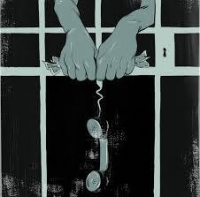
April 3, 2015
FOR IMMEDIATE RELEASE:
Illinois Department of Corrections #1 in Kickbacks for Prison Phone Calls
With the recent announcement that Ohio has approved cutting the cost of phone calls from prison by 75%, Illinois is now the leader for having the highest commissions in the country for such calls. The Ohio Department of Corrections had previously collected $15 million each year from prison phone calls. In Illinois, we collect in excess of $12 million in commissions a year from families who receive phone calls from their loved ones incarcerated.
Commissions, or “kickbacks,” are a percentage of money collected from phone calls by a private company that go back to the state for the right to have an exclusive contract. The Illinois Department of Corrections (IDOC) has a commission rate of 76% according to a contract with Securus Technologies, one of the two largest prison phone companies in the nation. Securus won the contract in 2012, beating out a local provider in Charleston, Illinois, by offering such large kickbacks.
Each year, $12 million in commissions are deposited into the Illinois General Assembly’s 523 Fund, about which there is no public information. When asked, the IDOC said it “does not maintain or possess records” of where this money goes.
The gouging of families by such prison profiteers is under scrutiny by the Federal Communications Commission (FCC), which is currently considering regulating intrastate phone calls. In 2013, the FCC imposed caps on the cost of interstate calls.
As Miguel Saucedo, who has a brother incarcerated in Menard Correctional Center, told us, “We’re supposed to be trying to rehabilitate the people who are locked up, not trying to profit from them.” We documented the voices of those affected in our video “Kick the Kickbacks” that can be watched online.
State regulators should take steps to end the commissions taken in by the IDOC. The House of Representatives should pass HB 3095, a bill currently under consideration which would eliminate all kickbacks. Illinois, following the example of Ohio, does not need to wait for the FCC ruling to negotiate with corrections officials to lower the cost of phone calls.
The Illinois Campaign for Prison Phone Justice, a project of the Urbana-Champaign Independent Media Center, is a member of MAG-Net (Media Action Grassroots Network), and a part of a national campaign for prison phone justice with our partners Human Rights Defense Committee and Nation Inside.